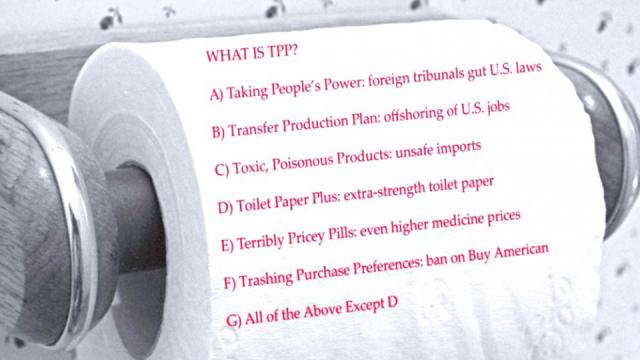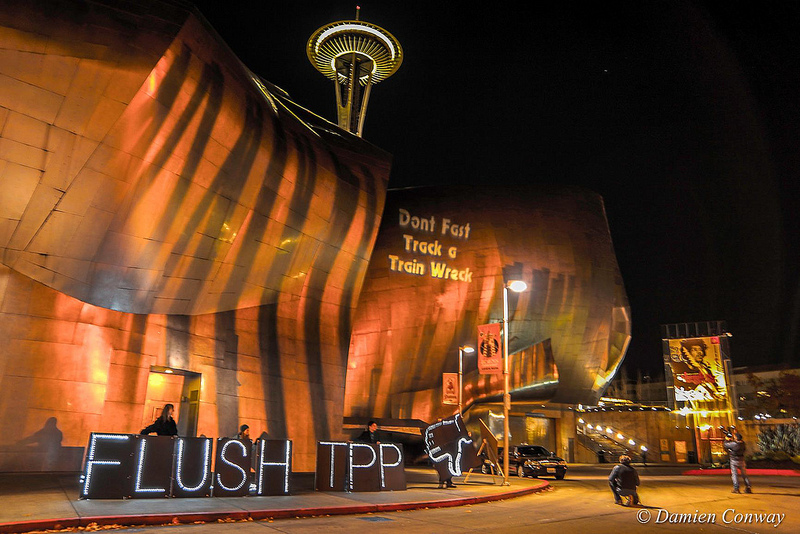
While its name is deceptively benign and boring, the Trans-Pacific Partnership (TPP) is a highly secretive international corporate trade deal known to its critics as “NAFTA on steroids.”
A quick recap: NAFTA, the North American Free Trade Agreement that was signed into law two decades ago by President Bill Clinton, is widely seen as a behemoth blister on the sickly economies of both the U.S. and Mexico. Thanks to NAFTA, over 600,000 U.S. jobs were displaced to Mexico due to the cheaper cost of labor; U.S. wages stagnated or dropped due to the threat of companies "moving to Mexico"; Mexico lost over 1.3 million farm jobs to U.S. agribusiness; workers rights in both countries plummeted; corporate regulations all but disappeared, and the environment suffered – or shall I say, suffers.
The TPP is an evolution of that process, but something much, much larger in scope. It is a 12-nation "agreement" (United States, Japan, Mexico, Canada, Australia, Malaysia, Chile, Singapore, Peru, Vietnam, New Zealand and Brunei) that puts the rights and interests of corporations high above those of the millions of people it would affect.
This evolution is particularly dangerous because, first off, when taken with the Transatlantic Trade and Investment Partnership (TTIP) – another controversial trade agreement on the table between the U.S. and the EU – the deals cover economies representing more than 60% of global GDP, enacting an economic and political platform that promotes some frightening prospects for the future.
A few chapters of the TPP agreement were leaked last fall by Wikileaks. From these documents, it's clear that the TPP would:
-
Offshore millions of good-paying jobs to low-wage nations.
-
Expand pharmaceutical monopoly protections and institute longer corporate patents.
-
Decrease access to affordable healthcare.
-
Limit attempts to label and/or ban GMOs while allowing the import of goods that don't meet even U.S. safety standards (not to mention standards in other countries).
-
Safeguard Wall Street risk-taking and cripple existing and future regulations on Wall Street activities.
-
Encourage the privatization of land and natural resources.
-
And through Investor-State Dispute Settlements (ISDS), allow multinational corporations and private investors to sue sovereign nations for loss of profit.
In fact, ISDS essentially gives corporations the ability to avoid adhering to national judicial systems, moving "disputed" cases between multinationals and country governments to an international tribunal comprised of three private sector attorneys.
Furthermore, under ISDS the countries cannot appeal decisions but will be forced, if a ruling against them passes, to pay out damages for the corporations' loss of income – or even their damage to “expected future profits” – even if such a payout might bankrupt that government.
The causes of these losses are, typically, the rules and regulations that countries have put in place in order to protect people and the environment from unruly corporate behavior. Under the TPP, corporations could break these rules and regulations only to turn around and sue those countries for having them in the first place.
For example, in a similar investor-state provision, Ecuador was forced to pay out $2.4 billion to Occidental Petroleum last year in a dispute over oil exploration, in which Ecuador tried to annul an agreement based on Occidental Petroleum's bypassing of “necessary government authorization.”
Stripping Our Digital Freedom
As if all of this weren't enough to condemn the TPP as the most horrendous display to date of legalized, corporatcratic power grabs, Wikileaks's unveiling of the IP Chapter highlights yet another facet of this evil trade pact: control over the Internet.
As mentioned, the TPP includes a safeguard for patents, making it so that pharmaceutical companies can protect their bottom line at the cost of human health and scientific innovation. But the patent protection isn't just for Big Pharma.
As Wikileaks explains, “The Chapter’s subsections include agreements relating to patents (who may produce goods or drugs), copyright (who may transmit information), trademarks (who may describe information or goods as authentic) and industrial design.”
Again, under ISDS, a country that seeks to implement a more user friendly copyright law can be sued by big corporations which claim that by allowing people to share and rework material, they have lost and will lose profits.
On top of that, the TPP would give a nod to harsh legislation that further restricts free speech, privacy and innovation.
For example, under the TPP, your service provider can be “forced to police your internet use and kick you and your family offline just for being suspected of breaking their rules. No judge, no jury, and no due process,” Meghan Sali of Open Media explains. “If the TPP internet censorship plan is sealed, the way we use the internet could change forever.”
Before you shrug your shoulders and say, “I've never infringed on anyone's copyright,” think again. Under these new rules, something as simple as sharing an artist's work on Facebook could land you in jail, even if you credit them for the work.
Again, as Sali points out, the very way that we have come to use the Internet to collaborate, explore, share and innovate would be crushed by the TPP.
In light of this, Open Media conducted a worldwide crowd-sourcing survey to find out what people wanted from their copyright laws.
“The consensus was that copyright terms should focus on compensating creators during their lifetime and then enriching the public domain after their deaths,” Sali said in a recent TPP teach-in.
In a poll of more than 40,000 people from around the world, she said, “85.1% of those polled said they wanted [copyright] to be no longer than the death of the creator.”
As of today, U.S. copyright law equates to life plus 70, meaning that an artist's work is under copyright for their entire life plus 70 years after their death. The TPP would extend the copyright even longer in all 12 countries.
However, there's a catch: because the Internet doesn't exist in just 12 countries, online users all over the globe would find themselves subject to these new yet surprisingly archaic copyright laws.
Of course, there would need to be vast surveillance mechanisms in place to police any suspected copyright infringement. Not to worry. As Wikileaks points out, “The IP Chapter also replicates many of the surveillance and enforcement provisions from the shelved SOPA and ACTA treaties.”
The TPP also has a Trade Secrets section that makes it a criminal offense to access or share trade secrets using a “computer system.” Unlike copyright law, a trade secret is always a trade secret – and is always protected. But what exactly is a trade secret?
Jeremy Malcolm, Senior Global Policy Analyst at Electronic Frontier Foundation (EFF), explains that the definition used in the TPP is a “cross-reference to the TRIPS Agreement, which is the first major multilateral trade agreement that included IP."
"Its definition is very broad: information that is secret in the sense that it is not generally known to persons that normally deal with that kind of information, that has commercial value because it is secret, and that has been subject to reasonable steps to keep it secret,” he said.
It's not just the definition of a trade secret that's broad. The definition of offense using this said “computer system,” is also sweeping, as Maira Sutton of EFF points out. It's basically any “unauthorized, willful access to a trade secret held in a computer system, regardless of whether the trade secret is copied or disclosed," she said.
"This provision has more in common with the CFAA which criminalizes anyone who 'intentionally accesses a computer without authorization…and thereby obtains…information from any protected computer,' one of the provisions under which Aaron Swartz was charged," she added.
Indeed, if you look at the verbiage between CFAA and the proposed Trade Secrets section, it's clear that the former inspired the latter.
Under the TPP, “the unauthorized, willful access to a trade secret held in a computer system; the unauthorized, willful misappropriation of a trade secret, including by means of a computer system; or the fraudulent {or unauthorized} disclosure of a trade secret, including by means of a computer system.”
And under CFAA: “intentionally accesses a computer without authorization or exceeds authorized access ... knowingly and with intent to defraud, accesses a protected computer without authorization, or exceeds authorized access ...the term “exceeds authorized access” means to access a computer with authorization and to use such access to obtain or alter information in the computer that the accesser is not entitled so to obtain or alter...”
Sutton breaks these findings down. “So in sum, these provisions go further than current U.S. law, potentially criminalizing anyone who gains access to secret information of commercial value. There are no safeguards to protect investigative journalists, security researchers or whistleblowers, who may obtain access to information without criminal or commercial intent. The inevitable result will be to chill the speech of those who might otherwise have a valid public interest justification for releasing information that had been kept secret," Sutton said.
This is all hugely problematic in a deep sense concerning our democratic rights. Imagine Chelsea Manning and Edward Snowden. Now imagine an international ruling that criminalizes their actions, going much further than current U.S. law. How many more whistleblowers and hacktivists would be silenced before we, the people, ever get to hear their voices?
How many collaborations, reworkings, remixes, shares, innovations, calls to action, information leaks, educational posts, videos, and images will be taken down or never put up – never thrown into this digital landscape that has become the voice of the people in the 21st century? How many millions of jobs, how many rivers, forests, farms and lives will be destroyed by this trade deal?
Most of the TPP documents are still secret, as are all the negotiations and dealings regarding its progress and passing. Right now, many organizations are working to stop the TPP and the proposed Fast Track that would allow it to completely bypass Congressional oversight or debate.
Check out these links – on EFF, Flush the TPP, Open Media, and Stop the TPP – for more information.
As WikiLeaks’ Editor-in-Chief Julian Assange put it: “If instituted, the TPP’s IP regime would trample over individual rights and free expression, as well as ride roughshod over the intellectual and creative commons. If you read, write, publish, think, listen, dance, sing or invent; if you farm or consume food; if you’re ill now or might one day be ill, the TPP has you in its crosshairs.”
3 WAYS TO SHOW YOUR SUPPORT
- Log in to post comments












